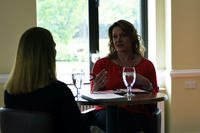Most military bases are nowhere near your dream job. The Marine Corps has still not transferred my husband to Paris or Bora Bora, no matter how much I want to pursue my ideal job of Very Glamorous Travel Writer.
Yet where we choose to live each time we PCS can have an unexpectedly big impact on spouse job prospects -- especially at the larger bases and posts.
Spouses must ask themselves the kinds of questions few civilians contemplate:
- Will living by the front gate versus the back gate really make a difference when it comes time to look for a job?
- Am I closer to a place with lots of job openings if I choose to live on one side of the post or the other?
- Will potential employers think I live too far away?
- Will I be able tolerate the commute?
Say you are headed to Camp Pendleton, Calif. On the southern side of the base, a commute to the greater San Diego area is absolutely doable. To the North, you have Los Angeles. If you are a struggling actor with the Hollywood sign tattooed on your heart, which side of base you might want to call home should be abundantly clear.
For Navy spouse Lacey, where she and her family would set up house and home at Pendleton was a lot more confusing.
“I had never even been to California,” Lacey said. “I had no idea what I was doing. I work in a dentist’s office in Virginia, and I was hoping to find the same kind of job in California eventually. I had school districts to think about for the kids, my husband’s commute, and where he wanted to live to factor in. I just didn’t stop to think about where might be best for me and my job.”
From the many spouses we have spoken to, Lacey’s experience is par for the course. With everything else going on -- from uprooting your family in one place to settling them into another -- PCSing is overwhelming. It is easy to forget to factor in your career and where jobs are in abundance.
“I just sort of found a nice house we could afford close to schools and near the base and that was that,” Lacey said.
Lacey spent the next 11 months looking for work before she finally found a job on the outskirts of San Diego. “If I’d done the grunt work for my own job first, I’d have realized I was looking for houses in the wrong places. But I wasn’t thinking about it, and now I have a long, expensive commute,” she said.
According to Valerie, a Marine Corps LINKS (Lifestyles, Insights, Networking, Knowledge, Skills) volunteer, veteran spouse and former nurse, this happens all too often.
“At least half the wives I talk to haven’t even considered where they are going to find work before they sign on a house or apartment,” she says.
Valerie interacts with many new and new-to-the-area spouses through LINKS. She says that along with giving them a hearty welcome, she makes sure to dish out some priceless career advice. “I keep saying to them -- before you sign on the dotted line, think about where you can work! If you want to live someplace that has a nice house, that’s great. But can you get a job there, too?”
Valerie worked in the medical industry for 25 years -- the entire time her husband served in the Marines and then some. They navigated a dozen PCSs, but every time they moved to a new base, she and her husband would have the exact same conversation. “He would say, ‘We need to live by this gate so I can be closest to work,' ” she said. “And I would say, ‘You’ve got to be kidding! That puts me an hour from any hospital where I can work. We’re both going to have to commute some.’ ”
And so for 25 years, they shared a commute. Her husband never drove more than 45 minutes to work, she said. “Even some guys who lived on the base had to commute that far. But this way, I only commuted for 45 minutes too. I wasn’t two hours away from a job. It made my career possible.”
Her secret? “I figured out where I might be able to work and oriented our move around it.”
Valerie said that when you’re moving to a new base, the important thing to keep in mind is that you are already putting someone else first. “We are only going to this place for your job,” she’d say to her husband. “So my job gets to be number two. Your job gave us a location. My job is giving us a neighborhood.”
As soon as they had orders in hand, Valerie would research the new area where they’d be living. “I always had a check list. One: Where are the jobs? Two: What’s the best school district around those jobs? Three: What can we afford in that district? That’s how we made every real estate decision for two decades. And it worked!”
Valerie says that looking critically at the job market where you’re moving and thinking about your real estate choices accordingly is just as important for spouses launching new careers as it for those whose professional path is long established.
“Even if you don’t know what your passion is yet and you’re starting out, try to position yourself on the side of the base that has the most access to jobs,” she advises. “There’s bound to be one side that’s better than another. If you want to have the most options possible, you’ll find a way to live happily on that side, no matter what the real estate options look like.”
For many spouses, that means positioning yourself nearest to the closest city or large town where there will be the most job opportunities. Do your homework: Is there a nearby hub for your field? Where are the most job postings in the region located? What are your transportation options? Is there a highway with quicker access to the nearest city close to one of the back gates?
With a little research in hand, your house hunt will be all the easier. You might realize that there’s one side of the base you just can’t afford to live on -- it’s too far from any job opportunity at all -- or maybe another side is the perfect place to call home.
Regardless of where you are in your job search, taking the time to make this initial investment in your move and your career will make the entire PCS easier. And it will better position you to be happy in your move.
“I worried I was putting myself ahead of my family when I insisted we live on the D.C. side of Fort Meade,” said Army wife Jeaneen.
Jeaneen was an executive assistant for the president of a non-profit in Georgia before they moved to Maryland. She loved her career and was committed to it, so the new PCS posed the same challenge many spouses are facing now: Where at this new base is the best place to set up shop?
“Everyone I knew was hoping for on-base housing, and all the other wives were just going to move to wherever made their husband’s commute easiest. I knew that living on the D.C. side meant more of a commute for my husband than on-base housing, and I worried it meant my kids might be among the only military kids in their schools. But I’ve always worked as an executive assistant, and we depend on my income."
Jeaneen spent a lot of time researching potential employers and job openings before she settled on area to conduct her house hunt. But all that research made her decision easy.
“Living closer to D.C. and not further away from it was the obvious choice. I love my job, and I knew being closer to the District was the only way I’d have a chance at a job.” She landed a job two months after the move -- in D.C., just like she expected. “My kids are in a great school, my husband’s commute is less than mine, and I get to go to work every day at a job I love. That’s a win-win-win.”
Factoring in your potential job doesn’t mean you have to have already applied to jobs. Like Jeaneen, you could just be starting your job search. But knowing where the jobs are, and how to be situate yourself closest to them, will make applying for and getting one infinitely easier when the time is right. “You have to go where the jobs are,” Jeaneen recommends. “It’s the only way you’ll get one.”
And that is exactly what you should be doing as you prepare for your PCS. When you think about where you’re going, don’t just think about where the best on-base housing is, or what neighborhood has the cutest Craftsman-style homes.
Take a good hard look at a map and the job market, and go where you think you’ll be most likely to find work. “If you have a dream for a job or a career, don’t give up on it before you even move in,” says Valerie. “Find a place where you can make both jobs and both careers happen. Your marriage and your bank account will thank you.”























